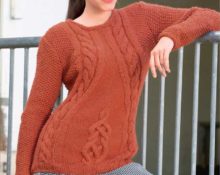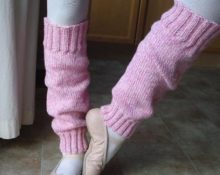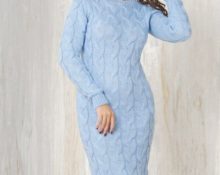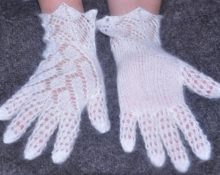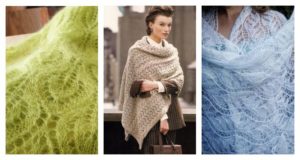 Girls are used to dressing up and brightening up their boring everyday looks with a variety of accessories. But there is an accessory that is ready to dilute any style - a stole. Like all classic things, it is ready for different combinations.
Girls are used to dressing up and brightening up their boring everyday looks with a variety of accessories. But there is an accessory that is ready to dilute any style - a stole. Like all classic things, it is ready for different combinations.
A scarf could compete with it, but it is used only in the cold season. And a light stole can be tried on in windy summer weather with shorts and a T-shirt.
What is a stole?
A stole is a cape that can be made of various materials. Knitted stoles are very popular. Let us examine in detail several of the most charming models with diagrams and descriptions.
Choosing mohair and knitting needles
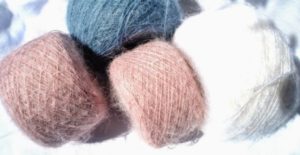 Mohair yarn is often used for a lovely stole. This is a thread made from the hair (wool) of Angora goats. The huge range of colors is very impressive, because mohair can be dyed. The yarn must be chosen uniformly, the thickness depends on the product. There should be no tangled fibers, the thread is always tender and soft.
Mohair yarn is often used for a lovely stole. This is a thread made from the hair (wool) of Angora goats. The huge range of colors is very impressive, because mohair can be dyed. The yarn must be chosen uniformly, the thickness depends on the product. There should be no tangled fibers, the thread is always tender and soft.
Knitting needles are selected after choosing the yarn, since the thickness of the knitting needle always depends on the thickness of the yarn. Ideally, the thickness of the knitting needle should be twice as thick. But this cannot always be attributed to mohair; for it it is recommended to select knitting needles 2-3 mm thicker than the yarn.
Important! For mohair, the knitting needles should be 2-3 mm thicker than the yarn.
Step-by-step knitting of a mohair scarf-stole
All stages of making a mohair stole begin after choosing a model and preparing all the necessary tools.
Advice! The knitting needles are chosen thin to create an elegant, dense pattern. If the knitting needles are thick, the pattern will be looser and the product will be translucent. Who likes what.
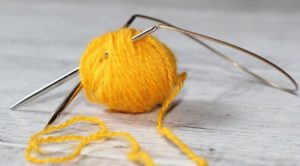 According to the stole pattern, we first try to knit a small sample (10-12 cm square or repeat). Using it, we then calculate the required number of loops, taking into account the repeat of the main pattern.
According to the stole pattern, we first try to knit a small sample (10-12 cm square or repeat). Using it, we then calculate the required number of loops, taking into account the repeat of the main pattern.
How to cast on the first loops? First, cast on the loops of the selected pattern on 2 folded knitting needles.
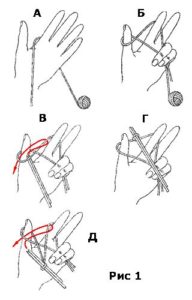
We calculated the number of loops and cast on the required number of loops with knitting needles. We knit according to the pattern of the model.
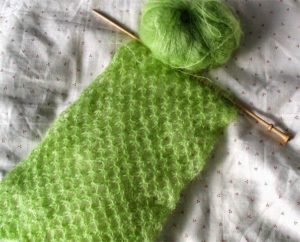
We calculated the length of the product and knitted as many pattern repeats in height as the accessory required.
Decorations, like the models themselves, can be very diverse. This includes embroidery with beads and beads. Fringe, tassels and various ribbon decorations. And this is the final stage for any product.
Openwork stole
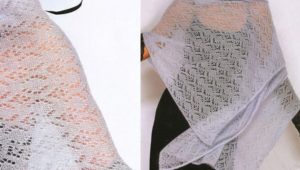 The most delicate mohair stole can be knitted using knitting needles in an openwork pattern. A model made of gray yarn and a thin mohair thread that covers the shoulders like a cobweb - a very sophisticated look. To work you will need:
The most delicate mohair stole can be knitted using knitting needles in an openwork pattern. A model made of gray yarn and a thin mohair thread that covers the shoulders like a cobweb - a very sophisticated look. To work you will need:
- knitting needles No. 4 and 3.5;
- yarn with mohair at least 80% (25g/250 m) - you will need 125 g.
The product measures 70 by 180 cm.
Stage 1: set of loops
In order to calculate a set of loops, you first need to knit a small sample. This is necessary because everyone knits with different degrees of thread tension.
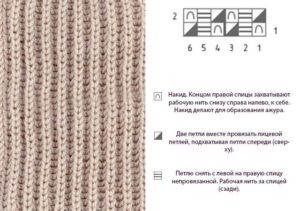
English rib knitting
After casting on the loops, you need to knit approximately 1 cm with an elastic band 1*1.
Stage 3: main canvas
After the elastic band, we move on to the main fabric and perform it according to the given openwork pattern with knitting needles.
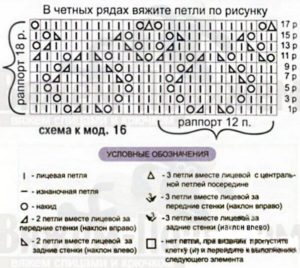
After reaching the required length, we again switch to the elastic according to the pattern and also knit 1 cm. Close the loops and the product is ready.
Stole made of medallions
A wonderful model made from fragments of medallions. It is convenient to knit small pieces and then join them together.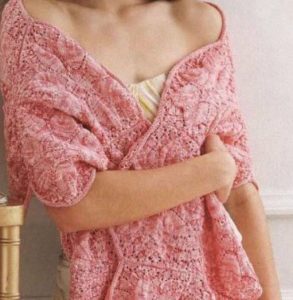 To work you will need:
To work you will need:
- mixed yarn 500 g;
- stocking needles No. 3.5;
- markers.
In total, you will need to create a complete 16 medallions according to the scheme and connect them into a whole canvas.
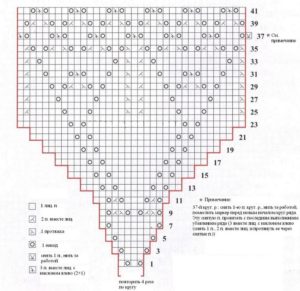
Start from a circular row and according to the pattern you need to do 4 times. Then continue working according to the indicated pattern and reach row 41. By this time, taking into account all the yarn overs, there will be 144 loops on the knitting needles.
Important! Pay attention to the notes given in the diagram, which start from row 37.
Product assembly. When all 16 medallions are ready, combine them so that you get 2 rows of 8 each.
Mint stole knitted
Model of a luxurious and very delicate product with diagrams. The size of the canvas is 180 by 54 cm. A lot of yarn overs and bevels are used in the work and as a result very interesting elements are obtained.
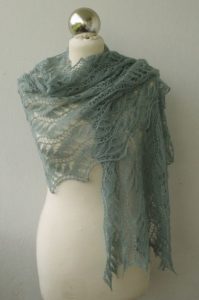 To work you will need:
To work you will need:
- DROPS Lace yarn 800 m / 100 g, with 30% silk content and 70% alpaca content;
- knitting needles No. 4 mm.
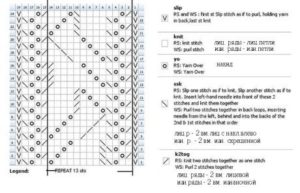 Stage 1: counting loops
Stage 1: counting loops
You need to familiarize yourself with the pattern according to the diagram and try to knit a small sample and it will help you count the number of loops for the initial set.
Important! Make sure that the number of loops is a multiple of the repeat of their pattern.
Stage 2: length
After casting, we move on to knitting according to the pattern. We continue knitting and take measurements as we complete the rows. Having reached a length of 180 loops, you do not need to immediately close the loops. It is better to finish the repeat and then close the loops so that the product turns out symmetrical in pattern.
Elegant white stole with braids
This is a model that will easily match with any clothes. Everything is not only in white, which loves any combination, but also in a lovely pattern.
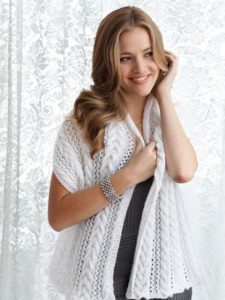
To work you will need:
- knitting needles No. 4;
- yarn 240 gr.
Schematic for this product:
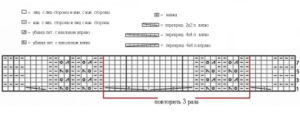 The product measures 37 by 140 cm. Using knitting needles of the appropriate number, cast on 87 stitches and start with garter stitch. Knit only 5 cm with this pattern and move on to the main pattern, but in the first row add 17 stitches evenly. As a result, there should be 104 loops on the knitting needles. Knit and repeat 3 times.
The product measures 37 by 140 cm. Using knitting needles of the appropriate number, cast on 87 stitches and start with garter stitch. Knit only 5 cm with this pattern and move on to the main pattern, but in the first row add 17 stitches evenly. As a result, there should be 104 loops on the knitting needles. Knit and repeat 3 times.
Knit 138 cm according to the given pattern and switch to garter stitch again, make only 3 rows and bind off the loops. Now the stole is ready.
Beautiful patterns for knitting stoles
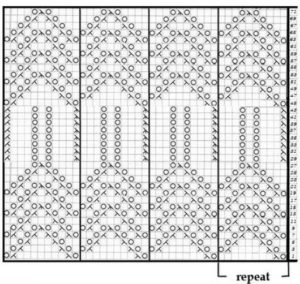
Scheme 1
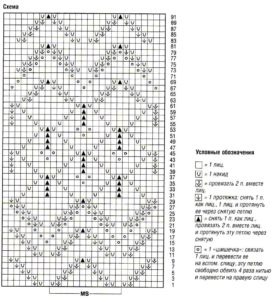
Scheme 2
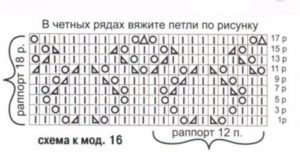
Scheme 3
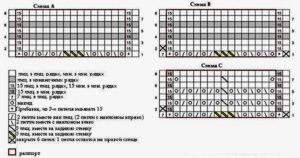
Scheme 4
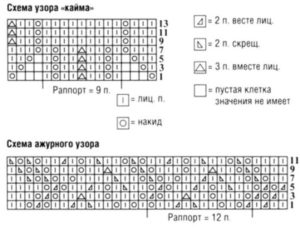
Scheme 5
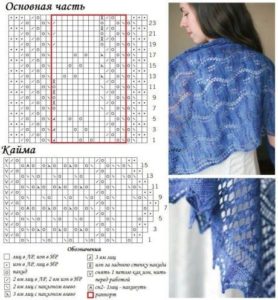
Scheme 6
Knitting a stole is not that difficult. Moreover, it is, most often, a solid canvas. Therefore, when learning a pattern, it will be useful for a beginner to practice doing such simple and pleasant things. This way you can move from simpler schemes to more complex models.


 3
3
